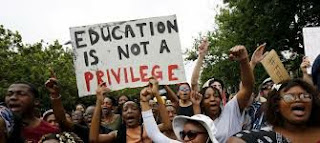The Zambia Daily Mail in its edition for Tuesday February
14, 2017 reported that Information and Broadcasting Services Kampamba Mulenga
expressed concern that the media has continued to focus on trivial, divisive
and unproductive issues in their daily reportorial work. Speaking during the
commemoration of World Radio Day in Livingstone on Monday February 13, 2017,
the minister further said “the dissemination of factual, objective and well-researched
information and news to the public is a huge national responsibility which the
media cannot afford to mishandle through careless, petty and personal
considerations.”
This is not the first time such concerns have been raised
on the need for the ethical and professional conduct of the media in our
country. Over the years, there have been repeated calls by stakeholders such as
the government, the church, NGOs and the media itself in Zambia to avoid
inflammatory, biased, unprofessional and unethical reporting as these have the
potential to disrupt the peace that the country has enjoyed for many years now.
Following the
country’s transition from one party state to multi party democracy in 1991, there
were many expectations that the political trajectory marked the
beginning of an era in which the media would be an autonomous and responsible
contributor to the social, political, and economic life in Zambia. The reintroduction
of multi party democracy in the country thus, saw a proliferation of many
private media institutions other than the mainstream government media such as The
Times of Zambia, The Zambia Daily Mail, and the Zambia National Broadcasting
Corporation (ZNBC).
However, years after the transition, the subject on
the conduct of both the public and private media has continued to draw a
contested debate among many citizens and stakeholders. Hence the question; has
the media lived up to its post multi party expectations in Zambia?
Although a number of factors can be attributed to
the polarization of media industry currently being witnessed in Zambia today,
issues of media law reforms, media self regulation and media ownership and the
training of media practitioners are among the main factors that have shaped the
media industry in the country. Following the liberalization of the media
industry in the post 1991 period, it has become much easier for anyone to set
up a media organization in the country to gather and disseminate information to
the public. Equally so, there are many people that are being employed to work in
many media organizations who lack professional training to practice in the
industry. As a result, such ill qualified media personnel do not adhere to media ethics but instead owe their loyalty to individuals who control and own such media organizations.
Therefore, in such an environment, it is difficult for the media to operate
professionally and account to the public to whom it owes a huge national
responsibility to disseminate timely, objective, accurate, well-researched and balanced information. There
is therefore, an urgent need to develop appropriate training in order to build
capacity, intellectual and analytical skills required for the media personnel to
respond to the calls for a more responsive and accountable media in our country.
However, other factors such as technological
dynamism and the changing patterns of news and media consumption by the public have
also shaped the media landscape in the country. This has had thus a huge
bearing on the media’s conduct and reporting. In addition, there is no doubt
that the advancement in the era of information and communication technologies
(ICTs) and the revolution of the internet have also led to an unprecedented
information explosion where the traditional media no longer holds monopoly to
news or information. This means that the public no longer entirely depends on
the media for “breaking news”.
For instance, the emergence of web 2.0 applications which
include social media networks such as Facebook, Myspace, Instagram, LinkedIn, You
Tube, Twitter, blogs and wikis have entirely changed the news and media landscape
and the practice of journalism worldwide. However, although this information
revolution represents both great opportunities for the media, it too poses a huge
threat for unethical, untruthful and unprofessional media practice. This is
both the opportunity and challenge that web 2.0 technologies such as social
media networks have brought to the media industry. This means therefore, that the
control, access and ownership of the media has been left to anyone with a PC,
iPhone or Smartphone, who can disseminate, publish blog, tweet or post anything
on facebook at anytime, anywhere without any restrictions.
Going forward, there is need for the government to
come up with a comprehensive media and communication policy for the country
that will bring into perspective these changing social and technological
dynamism that are taking place globally. Further, both the media and the
government should closely work towards actualizing media law reforms previously
embarked on. However, the biggest challenge is for the media itself to remain
relevant, responsive and accountable to the public by providing objective, accurate,
well-researched and balanced information
in this fast changing media landscape and competitive global information era.




















